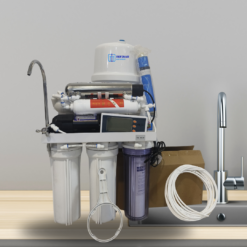Description
Ultimate Water Purifier – The Reverse Osmosis Machine
Say goodbye to impure water and hello to pure refreshment with our Reverse Osmosis machine.
This machine turns salty or borehole water into clear, clean goodness. Imagine water free from yucky stuff like TDS, salts, metals, and other ickiness. It even says bye to particles that make water look and taste bad.
How Does It Work? Our Reverse Osmosis machine has 5 stages that work like magic. It starts with sand filtration, then uses super-activated carbon, followed by sediment filtration. After that, the Reverse Osmosis membrane does its thing, and a UV disinfectant adds a safety touch.
But wait, there’s more! Before this machine starts, it checks your water in a lab. This way, it knows exactly what to do to meet the highest standards set by KEBs and WHO, giving you the purest water possible.
Why Choose Our Reverse Osmosis Machine? It’s proudly made in Kenya, which means quality that’s budget-friendly. Plus, we’re so sure it works great that we give you a 1-year warranty and support for life. We’ll also teach you how to use it hassle-free.
If you’re thinking of starting a water business in Kenya, this is your golden ticket. Don’t miss the chance to give your customers top-quality water. Act now, and get pure, clean water with just one call!
Here are some frequently asked questions (FAQs) about Reverse Osmosis water purifiers:
1. What is Reverse Osmosis (RO) water purification?
- Reverse Osmosis is a water purification process that removes impurities and contaminants by using a semi-permeable membrane. It works by applying pressure to force water molecules through the membrane while blocking larger molecules and impurities.
2. What impurities can an RO system remove?
- RO systems are highly effective at removing a wide range of impurities, including TDS (Total Dissolved Solids), salts, metals, minerals, bacteria, viruses, chlorine, fluoride, and many other contaminants that can affect water quality.
3. How does an RO system compare to other water purification methods?
- RO systems are known for their thoroughness in removing impurities and providing high-quality drinking water. They typically outperform other methods like carbon filtration and UV treatment in terms of purity.
4. Do RO systems waste a lot of water during the purification process?
- RO systems can produce some wastewater as part of the process, but modern systems are designed to be more efficient. Look for RO systems with water-saving features to minimize wastage.
5. Is Reverse Osmosis water too pure to drink regularly?
- RO water is safe and healthy to drink regularly. While it removes most impurities, it retains essential minerals that are beneficial for health. Some people choose to remineralize RO water for taste preferences.
6. How often should I replace the RO membrane and filters?
- The frequency of replacement depends on water quality and usage. Typically, RO membranes last 2-3 years, while pre-filters may need replacement every 6-12 months. Follow the manufacturer’s recommendations for your specific system.
7. Can I install an RO system myself, or do I need a professional plumber?
- While some people with plumbing skills can install an RO system themselves, it’s often recommended to hire a professional plumber to ensure proper installation and avoid potential leaks or issues.
8. Are there maintenance tasks I should perform on my RO system?
- Regular maintenance includes sanitizing the system, checking for leaks, and monitoring water pressure. Refer to the user manual for specific maintenance instructions.
9. Can I use RO water for cooking and watering plants?
- Yes, you can use RO water for cooking, as it helps maintain the natural flavors of food. However, be mindful that RO water may lack the minerals that plants need, so it’s not ideal for watering plants long-term.
10. Is RO water cost-effective in the long run? – While the initial investment in an RO system may seem significant, it can be cost-effective in the long run by reducing the need for bottled water and improving overall water quality for your household or business.









Reviews
There are no reviews yet.